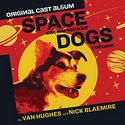|
 LOVE IN HATE NATION LOVE IN HATE NATION
ORIGINAL CAST RECORDING
Ghostlight Records
Digital
Rage is rampant and rock-styled as we encounter the residents of the juvenile hall that is the setting for the musical Love in Hate Nation. They are a proudly self-proclaimed "badass" bunch. The often feistily in-your-face recording of the show, with a score and book by Joe Iconis, is able to temper taunts and tirades with tenderness as romantic attraction between two of the troubled females is explored and explodes. The time is 1962, so there's far less acceptance of same-sex romantic feelings. The effectively claustrophobic clamor and bravado get respite via quieter confessional moments, humor, and dashes of campy personae that recall the genre of "B-movies" with jaded women behind bars. But the M.O. is not to dwell an overly long time in melodrama, open-wound angst, or sympathy-inducing character revelations before shifting gears and tones.
Birthed four years ago this month as a commissioned work at Penn State University, this reformatory story then had a run where the Iconis musical Be More Chill had its early life: at Two River Theater in Red Bank, New Jersey. The Jersey Love in Hate Nation cast (including a few holdovers from Penn) is represented on the recently emerged recording (no physical format at this time). There are 20 tracks, including one that's a very short instrumental to begin things, one with a major chunk of dialogue, and reprised material.
Although they are surrounded by a fiercely present set of clearly stamped types (the other strong-willed detainees), it's really only the two main characters who feel more sufficiently three-dimensional and get the lionesses' share of solo singing. However, Emerson Mae Smith cannot be ignored in her imposing portrayal of the trans Kitty. In the defiant declaration for self-determination, refusing to become a "Masochist," she fearlessly leads the rant's battle cry in the second act and in its bonus track reprise where she's joined by her real-life identical transwoman twin sister, Murphy Taylor Smith, who played the role in the first go-round.
Named for her own name, "Susannah's Song" introduces us to the easier-to-root-for new arrival played by Amina Faye who employs a plaintive voice to well serve the lyric's elements of vulnerability and self-awareness as she states, accompanied charmingly by a strummed ukulele, "I'm sweet 16, but Lordy, I feel a little sour/ 'Cause I'm too Black to be indifferent/ But too yellow to rebel/ And in my chest, that dread begins to sprout/ I make up songs in my head to tune it out." But never "too yellow to rebel" is Sheila, her soon-to-be love interest, who recalls, "Since the age of eight rebellion was just in my blood... I was a basket case/ I never really seemed to care" in the song about always feeling different and apart ("The Other One"), which Susannah can identify with, too, as it becomes a duet. The resolutely non-conforming, contrastingly hardened Sheila, is portrayed commandingly by Kelly McIntyre who later pours out her incrementally-revealed heart in "I Hope."
Lauren Marcus (who's been around Mr. Iconis in Be More Chill and in marriage) figures in the cast as the institution's power-pushing, non-pushover overseer, the equivalent of Chicago's Mama Morton and Annie's Miss Hannigan. She plays it with ease and some amusingly conveyed self-aggrandizing as she purports to confront the bad behavior with her good intentions, but doesn't have much musical time that would shift audience compassion to her tough job handling her toughened charges.
Although there are nods to some rock and punk-flavored styles and stances, the score is not a pile of pastiche to trigger feel-good nostalgia for the '60s. Not much is joyous, fluffy, or groovy there in juvie hall, but in "Oh Well" the two leads try to articulate their growing mutual affection, and Iconis adopts iconic syllable sounds of vintage pop–"sha-la-la" and "hey-hey-hey"–as substitutes for words they can't quite come out and say (since they're not both ready to come out).
Once again, Joe Iconis seems to be an empathetic kindred spirit giving voice to young misunderstood underdogs, those branded as society's misfits (myopically, sometimes). As he champions them, warts and all, we can be persuaded to at least give them a chance and see what makes them tick. Meanwhile, the writer-musician himself appears with George Salazar to reprise and update their Two-Player Game in Manhattan this week (closing tonight) at Feinstein's/54 Below (also streamed).
 SPACE DOGS SPACE DOGS
ORIGINAL CAST
Ghostlight Records
Digital
Those experiencing Space Dogs in person (its Off-Broadway run at MCC is currently scheduled through March 13) get a lot coming their way visually, from flashing lights to projections to puppets. They witness its high-energy two-man cast zipping about, taking on many characters, commenting while breaking the fourth wall, singing, strutting, and playing instruments. As an audio-only experience focused on its pop-styled songs–with some spoken lines, sound effects, and electronically altered voices–the cast recording can be its own pleased-to-be-peculiar power-packed punch.
Alternately bombastic or smugly zany, it might at first seem to be not much more than a nerdy, noisy joyride though the true early history of Russian space missions with, yes, dogs. However, beyond the bombast and trivia, Space Dogs makes space for sweetness, satire, fearlessness, and even manages an approximation of a dog's eye view of the goings-on.
Van Hughes and Nick Blaemire have done it all–concept, writing, performing, puppeteering, and cheering the martyred pup Laika for whom the scientists of the day had no way to return to earth alive. The songs sample a modest-to-medium range of pop/rock styles, sometimes self-hijacked in tone midway to add the element of surprise or a U-turn to reprise a bit of another number. While gleefully, gamely rocking out, tongues seem to be decidedly in cheek, and the dynamic duo's delight is palpable. Their attractive vocal harmonies (getting especially glowing in "Getting Me High") are a major asset, sugarcoating what could otherwise be unwisely gruff onslaughts. Don't miss the sense of winking or the sly messages or it might not seem worth the effort of wading through the more unsophisticated fare.
"A Brief History of Dogs" is a charming musical Wikipediafication of the species told in a nutshell, the number's noted nutty tone a plus. Songs questioning America's engaging Nazi Germany's engineer "Werner von Braun" and the fruits of "Progress" (but at what cost?) hit targets to challenge nations' priorities and ethics in weighing how the intended ends justifies the means. In a lighter vein, the inclusion of little howls and yips on some tracks somehow, surprisingly, doesn't get old. "A Russian Canine Beauty Pageant" is a blithe set piece with a multitude of character voices (Russian accents and puppy personalities). Just when you think it might be all goofy cartooniness, you'll be gut-punched by an animal's heartrending plea for a family. "Fuzziest Loneliest" gets deeper into the sorrow.
So, while Space Dogs is certainly an acquired taste, teetering between tough and tender, it's an oddly affecting oddball little gem when considered on its own terms.
|
|